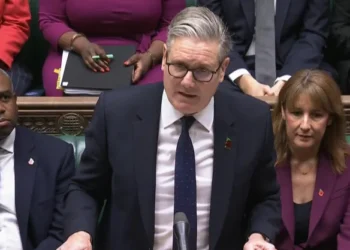The number of migrants crossing the English Channel into the UK in small boats has surged past 25,000 in record time this year, making 2025 the fastest year on record for hitting that threshold since tracking began.
According to newly released Home Office data, 898 individuals arrived aboard 13 boats on Wednesday, bringing the total number of arrivals by small boats to 25,436 so far. The milestone was reached significantly earlier than in previous years, compared to September 22 in 2024 and October 2 in 2023, reflecting a sharp acceleration in the scale of irregular migration.
Officials have confirmed the increase represents a 51% jump from the same period last year, when 16,842 crossings had been recorded, and a 73% increase from 2023, which saw 14,732 people by this time.
As the government intensifies efforts to, in their words, “smash the gangs” facilitating these dangerous crossings, political pressure is mounting. The rapid rise in crossings follows a string of policy announcements and interventions this spring and summer aimed at stemming the tide.
Government Ramp Up Efforts To Tackle Crossings
Prime Minister Keir Starmer recently unveiled a “one in, one out” deal with France, proposing to send irregular migrants back in return for asylum seekers with familial ties to the UK. While the deal has been announced, it has yet to move past its pilot stage.
Meanwhile, French authorities have ramped up cooperation by slashing dinghies already at sea to prevent departures, marking a more aggressive intervention following UK negotiations. Additionally, UK Foreign Secretary David Lammy introduced a new sanctions framework targeting individuals involved in cross-Channel smuggling operations.

Despite these efforts, the situation has escalated. On Wednesday, an additional 445 spaces are being readied to house male asylum seekers at RAF Wethersfield in Essex. This expansion comes despite earlier promises by the government to reduce occupancy at the site. A Home Office spokesperson, however, defended the move.
“All use of property or sites under our ownership is carried out in accordance with relevant planning permissions, and we work together with local authorities and other stakeholders to ensure the accommodation estate is continuously reviewed and managed safely and effectively at all times.”
Home Office spokesperson
However, the expansion of housing for asylum seekers has stirred unrest in local communities. In Epping, Essex, tensions flared after an asylum seeker was charged with allegedly attempting to kiss a 14-year-old girl at a hotel being used for temporary accommodation. The incident triggered a wave of protests, leading to 23 arrests and charges against 14 individuals.
Local leaders have since appealed to the Home Secretary, calling for the Bell Hotel in Essex to be “a priority for urgent closure,” citing significant strains on policing and social cohesion in the area.
The rising number of arrivals and growing community unrest has also drawn political scrutiny. Reform UK, led by Nigel Farage, has gained traction in recent polls, largely by criticizing the Labour government’s handling of immigration. Ministers are now facing mounting pressure to provide measurable outcomes amid the ongoing crisis.
Amid the political fallout, Downing Street recently issued a stark warning that the country could face a repeat of last summer’s civil unrest, declaring that Britain was “fraying at the edges.”
At a recent cabinet meeting, Starmer reportedly underscored the need to mend the country’s “social fabric” and improve integration efforts, particularly in communities experiencing elevated levels of migration.
READ ALSO: Shatta Wale Blasts Former IGP’s Inaction























